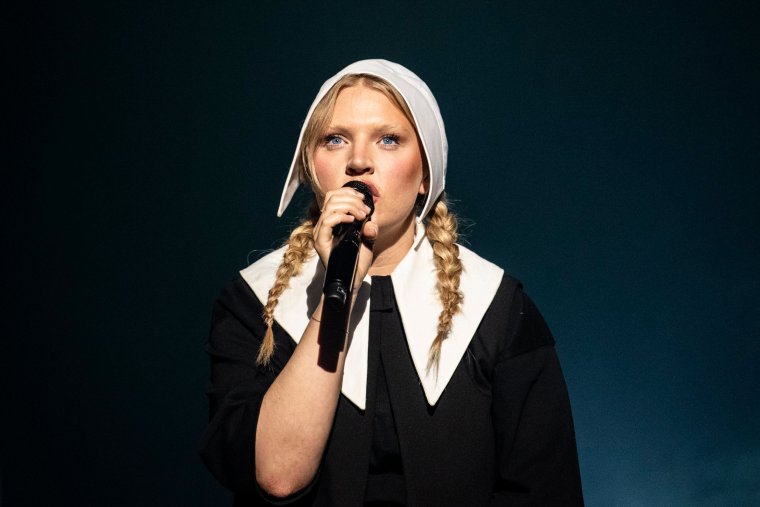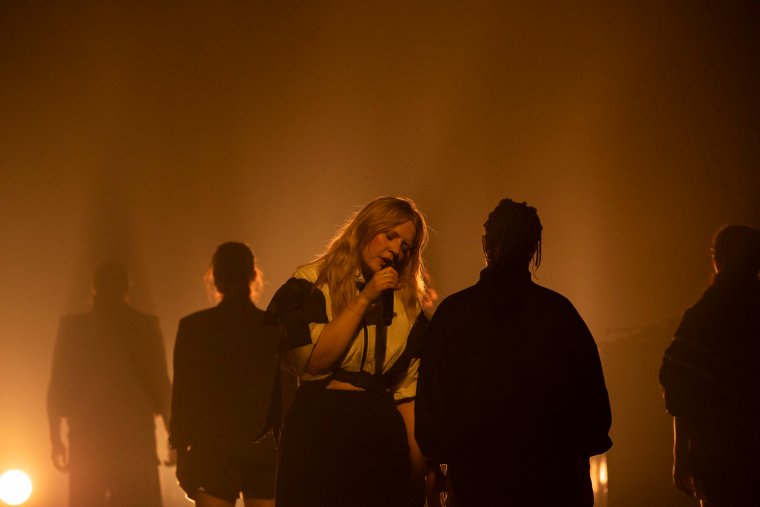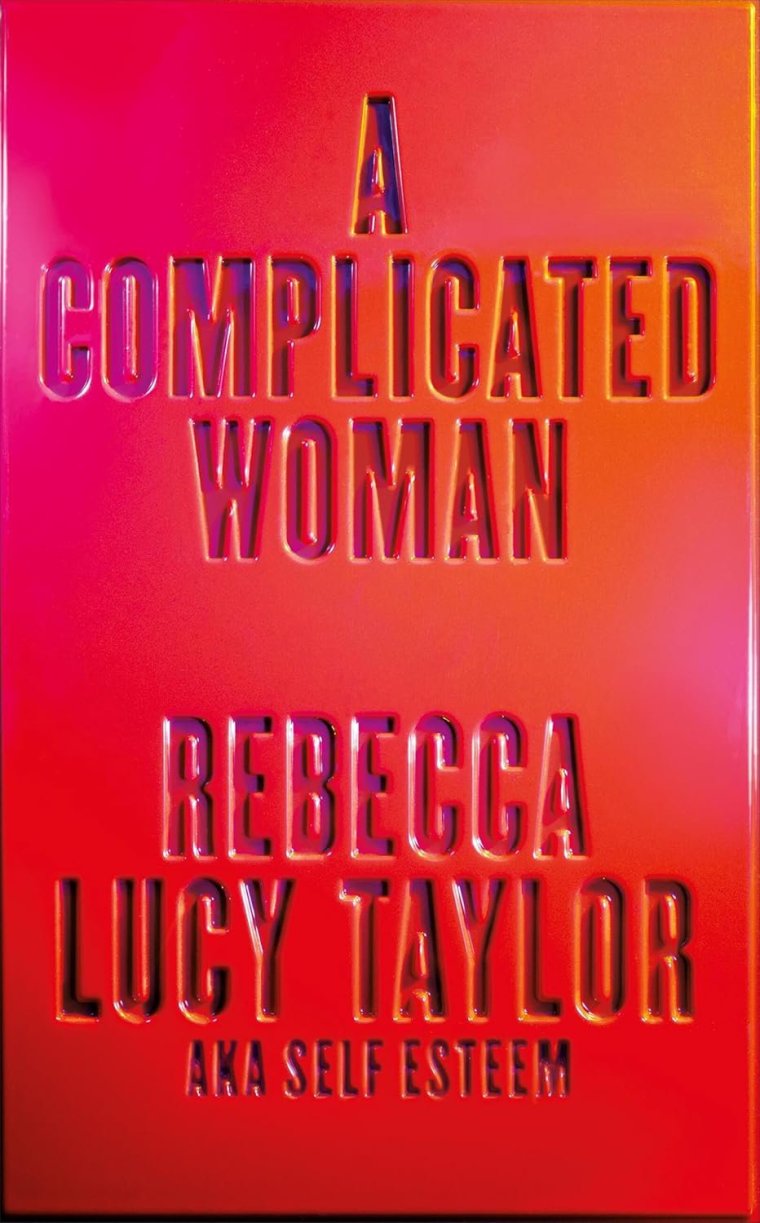Three days before meeting Rebecca Lucy Taylor in an east London pub, I saw her perform as Self Esteem at the final night of a three-show run at Brixton Academy. What a joyous spectacle. On stage, it was part club night, part art-pop theatre (like Madonna without the budget; or David Byrne doing The Handmaid’s Tale). Off stage, the crowd of predominately millennial women screamed back Taylor’s big, catchy DIY pop songs of female solidarity – witty, warm and wounded accounts of the knottiness of modern womanhood – with rageful delight.
Self Esteem’s liberating signature tune “I Do This All the Time” – from her breakthrough 2021 second album Prioritise Pleasure – was pure catharsis, its aphorisms on rejecting the expectations of the patriarchy landing defiantly. “You’re a good, sturdy girl” goes the famously condescending line Taylor was once told by a man. Everyone sang along like their life depended on it.
Taylor has clearly tapped into an instinctive feeling and her following is passionate. Her eagerly awaited debut book, a memoir of sorts, is out this week and already tipped to be a bestseller. And yet. “My streams are really low,” she says (circa 264,000 monthly listeners on Spotify). “On paper, I’m a flop. But then my gigs are like that. It’s a head fuck.”
Taylor tells me the whole tour was similarly ecstatic. “I needed it, though,” she says. It turns out she’s had a difficult year. Her third album, A Complicated Woman, “didn’t move the dial on my industry success”. Critical consensus was mixed; one scathing Pitchfork review has left a scar. But the feeling goes deeper. “I really hated the pressure of putting an album out. I hated making it. I’ve hated that I’ve doubted myself so much.”

Rotherham-born Taylor, who has just turned 39, recast as Self Esteem in 2015 after more than a decade in indie bands, most notably folk duo Slow Club, precisely to free herself from the shackles of self-doubt and restore the confidence sucked from her by a sexist music industry. The clue was in the name, and it proved prophetic: Taylor’s reinvention as Self Esteem restored her conviction, allowing her to come out as bisexual, make the music she wanted, and speak her truth. But making the new album, she says, “everything you think I think about myself went out the window. I regressed on it all. I’m still unpicking that now, like why?”
Has she come up with any answers? She suggests enigmatically there was “something personal about the making of [the album] that probably has a lot to answer for”. She won’t be drawn any further. “But then it comes back to me not trusting myself. The art suffered from me trying to make sure people weren’t mad with me again.”
Taylor has spoken many times about how people pleasing – particularly towards men – has been to her detriment. “I didn’t realise I was doing it. And that’s like the biggest betrayal, because the whole point of Self Esteem is that I don’t do that any more.” She says she’s proud of the album, even if she would change 15 per cent of it. “But that’s 15 per cent too much.” She smiles. “I think I was always gonna spend most of this year depressed and freaking out.”
Far from seeming depressed or freaking out, today Taylor is a hoot: quietly furious on some topics, yes, but funny, sharp, honest, a bit gossipy; you can see why she’s been embraced by the camper side of mainstream pop culture (Taylor has appeared on the likes of RuPaul’s Drag Race and Celebrity Bake-off). She’s also made her mark in theatre: last year she did a star turn as Sally Bowles in Cabaret and, next year, will play Maggie Frisby in David Hare’s Teeth ’n’ Smiles, a role first performed in 1975 by Helen Mirren (“that’s hilarious, isn’t it?”)

Sitting at the table nursing a cup of tea, dressed in a red bobble hat and blue rugby-style top, I’d guess she’d make a great best mate if I hadn’t just read her searingly entertaining new book, also titled A Complicated Woman. Composed of personal phone notes and newly written prose and verses – again, it’s furious, funny, sharp, honest, a bit gossipy – it confirms Taylor as a candid voice of millennial feminism, or at least the messy side of it. Throughout, it paints the tasks required for a friendship as anxiety-inducing.
“I text nobody back,” she says. “When I go for a massage, I’m like, ‘right – 90 minutes worrying about not texting x person back.’ But then I don’t text them back! I guess it’s got better because I’ve got a good excuse.” Taylor is incredibly busy – making the album A Complicated Woman, she was “burnt out, I had nothing in my head” – but not because she’s now the unassailably huge pop star people sometimes assume. “People go to me, ‘oh, what’s it like being rich and famous now?’ Well, I’m not.”
What Taylor does have is “cultural relevancy, or at least I did for a while”. Hence her book – launched with events at the Southbank’s London Literature festival, which Taylor is co-curating – is so widely anticipated her publisher warned her it might not reach number one in the bestseller charts because Jeremy Clarkson has a book out the same week. “I was like, ‘are you kidding?’ Nobody was even meant to read it! I only wrote it to make myself feel better.”
While she downplays the phone notes – “people are always like, ‘it’s poetry.’ It’s not though, is it?” – there are universal truths within, and not just on the female experience; Taylor says all millennials have had a weird time of it (as a fellow older millennial, I concur.) Regardless, her fanbase is going to lap it up. Taylor’s visceral mix of anger, despair, irreverence, anxiety and joy is confronting, at times uncomfortable, but addictive. The entries – many of which have turned up as lyrics in her songs – date back to 2015, a period when Taylor felt like a failure. Reading those “reaffirms my purpose with Self Esteem to avenge that poor cow”.
The notes breathlessly fly through thoughts on misogyny, relationships, sex, consent, hedonism, ageing, the music industry, societal pressures on women, mental health, her own ambition and insecurities: one section is titled “To Get Everything You Wanted Is to Realise Wanting Anything Is F**king Stupid”. Throughout, the notes veer from cries for help (“the millennial female experience will kill me”) to self-deprecating wit (“I fucked my way to the middle”) and the mic-droppingly wise: “Tell me anyone who ever left when they should have.”

She states the “17 Commandments of a Complicated Woman”. When I say my favourite is “Tantrums work” she lets out a scream of a laugh. “I’m reclaiming the word tantrum!” she says. “Sometimes as a woman, you have to lose your rag because they won’t listen to reason. You don’t get heard. I’m reclaiming the right to be hysterical sometimes.”
The highlight of the book is a short story, written mainly in lockdown, in which Taylor imagines she goes missing, leaving everyone guessing: has she been kidnapped? Murdered, even? Simply gone to meet someone for a one night stand? Or has she ended up searching karaoke bars for her own music? (Quite possible, she concludes.)
A lot of the story is darkly funny: she wonders what people (exes, management, friends, family) would think and how the press would report it (“as long as Dua Lipa, Rita Ora, Laura Marling or Florence aren’t missing that month, I would make the home page for sure”). The positives? It would be good for her career. “My Spotify [streams] would go up, I’m telling you now,” she smiles.
But she also makes strident points here about femicide – “you learn from your teens something gnarly is likely to happen to you,” she says – and lax police attitudes to missing women (in the story they correlate her neediness on social media to the likelihood of her going missing).
The story ends with her being found the morning after, merely hungover and surrounded by Deliveroo packages, in the company of Taylor as she is now: a guardian angel from the future who looks down on her younger self four years on with a mix of jealousy and horror. She tells her younger self it’ll all be OK.
Compared with the woman fantasising over her own disappearance, Taylor herself is much more settled today, embracing some of the societal norms that her songs so often questioned. She has a boyfriend, Wilf (“my current male lover”), an actor she met when she starred in Cabaret; success has allowed her to buy a flat in east London; she’s got a dog, and even decided to freeze her eggs, a photograph of which she puts in the book. “I just thought it was funny. That’s the most expensive thing I’ve ever done. And it might mean f**k all. But I did what I could to know I tried.”
Taylor says she’s pleased her parents can see how it’s all working out for her. Her mum, a secretary, and her dad, a steelworks health and safety officer, were both at the Brixton show I attended, and stayed the weekend in Taylor’s new flat for the first time. At times during the gig, Tayor was visibly choked up. “I was feeling emotional that I finally had this life that they could come and see was actually very positive and safe. Because they’ve always worried this career is not safe.”
How does she feel about her new-found domesticity? “I don’t know,” she says, mulling the question. “It’ll be interesting. I feel like we all need to be able to evolve. I’m certainly not sat in my flat with a relationship being, ‘now I’m fine, all I needed was money and a boyfriend.’” It’s not as though she’d just never met the right person until now, she says. More that “I’ve become a person who can now be in something like this. And I like it”.
Taylor says she feels hope again; something she wants to explore in her new songs. Which reminds me of one note in the book from May this year: “Coming out as uncomplicated on the next album.”
“I realised recently, I say all this and talk like this, but God, I’m not that complicated,” she says. “I’m just a basic white bitch struggling with having a phone.”
‘A Complicated Woman’ is published by Octopus, £22
